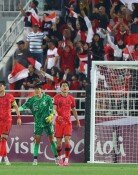Defectors accuse N. Korea of human rights infringement
Defectors accuse N. Korea of human rights infringement
Posted March. 18, 2014 04:48,
"Having born in North Korea was itself a human rights infringement," says a 34-year-old man who came to South Korea from Musan County, North Hamkyong Province in North Korea. He gets horrified whenever he recalls what he had gone through in the North. After going to China in 1999 for food, he was arrested by Chinese police there in 2001 and was deported to North Korea. Together with four other North Koreans from Musan, he was locked in a trunk of a sports utility vehicle and was moved to Musan. They were handcuffed with palms facing outwards.
He thought he was going to die without being able to meet his family. He was beaten with lumber, and was ordered six months of forced labor without trial. At a salt farm construction site, supervisors discharged from special forces troops beat him fiercely. He said, "I saw some people have their ribs broken by supervisors."
The Dong-A Ilbo and The Asahi Shimbun conducted an in-depth interview with 60 North Korean defectors by forming a special joint coverage team in December last year. It was prepared in line with the announcement of North Korean human rights infringement status report by United Nations Commission of Inquiry. Inquiry chairman Michael Kirby attended the 25th regular sessions of the U.N. Human Rights Council held in Geneva, Switzerland on Monday and submitted a summary of its activity outcome report. The council is expected to adopt a North Korea resolution late this month. The report is assessed as having devised a basis for international legislation to intervene in North Korea`s human rights infringement.
The two news outlets covered North Korea`s human rights infringement status and life of North Korean residents through interviews with North Korean defectors. It is the first time for a Korean media to jointly team up with foreign prominent media to conduct in-depth interviews on the defectors.
The stories covered are as shocking as the commission report. A woman defected from North Korea said, "After North Korea`s currency reforms in December 2009, most of transactions were handled in Chinese currency. North Korean agents looked inside women`s brassieres saying they are cracking down Chinese currency use."
Another defector said, "I wasn`t even able to recognize that what we went through was a human rights abuse. I learned about what human rights were only when I came to South Korea. In the North, we had to issue travel certificate, which I thought was natural. Well, this was also an infringement on human rights."
Headline News
- Med professors announce intention to leave hospitals starting Thursday
- Bridge honoring Sgt. Moon Jae-sik unveiled in Pennsylvania
- Chief of Staff Chung tells presidential secretaries to stay away from politics
- US FTC bans noncompete agreements
- N. Korea launches cyberattacks on S. Korea's defense companies







